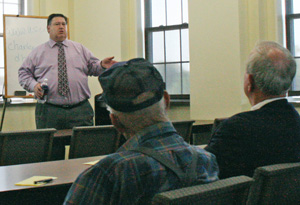By Anne Marie Amacher

DAVENPORT — A community relations officer with the U.S. Citizenship and Immigration Services (USCIS) talked about the recently enacted deferred action policy for young people and was on hand to answer questions from community leaders.
Charles Pratt spoke Aug. 27 at St. Vincent Center to a group that included several members of the Davenport Police Department, Davenport Community Schools, Quad Cities Interfaith, Quad City Federation of Labor, the Diocese of Davenport and Davenport’s mayor.
Pratt began his presentation by explaining how federal immigration services were structured prior to and since 2003. “Prior to 2003 it was the INS (Immigration and Naturalization Services). It was one body, one federal agency.”
That changed in 2003 with formation of the Department of Homeland Security. From there many separate agencies were created under the umbrella of Homeland Security, including three that deal with immigration issues.
One is USCIS, which grants benefits such as green cards, citizenship and change of status. That agency does not have the authority to arrest or deport. Another branch is Customs and Border Protection which protects U.S. borders. A third branch is Immigration and Customs Enforcement (ICE) that enforces the laws, can hold people in custody and can deport individuals.
“Each us of has different responsibilities,” Pratt said, noting that each department works separately, but also collaboratively when a need arises. Information is not easily shared – even between departments. “Guidelines must be met.”
Regarding the newly enacted deferred action policy, which the Homeland Security Department announced June 15, Pratt stressed that “It is only a policy and it can change.” If a new president were to be elected, the policy could end by late January.
Meanwhile, deferred action will be granted on a case-by case basis to youths who entered the U.S. before the age of 16 and meet certain criteria. They could receive deferred action for a period of two years, subject to renewal, and could be eligible to apply for work authorization, which is not automatic. Applicants must pass a background check and provide several documents to prove that they have been in the U.S. since before age 16 and have not been involved in criminal activity. When individuals receive eligibility to stay for two years, they must remain in school and out of criminal activity.
“This deferment is not a legal status. A green card is a legal status,” Pratt emphasized.
When asked how long it takes to get a deferred action approved, he said it depends on where the applicant lives. Applicants must be fingerprinted, and that is done at specified locations throughout the United States. Those in Iowa travel to Des Moines. For individuals traveling to Minneapolis or St. Louis for instance, application times will take much longer because fingerprinting sites are in the same location as the sites for obtaining green cards, citizenship and other statuses.
Individuals in Iowa who had their paperwork in order in mid-August when the deferred action policy began and have had the fingerprinting process completed could wait up to four months for approval. In larger states, approval could take even longer, Pratt said.
To obtain the work authorization card, the deferred action must be approved first, and could take another 60-90 days. “We can only do so much on our equipment with all of the other applications for citizenship and green cards that also must be done,” he said. Applicants seeking a work authorization card must not only prove eligibility, but demonstrate a need to work.
One questioner asked: If someone under 18 applies, could that lead to the deportation of the parents? “The form asks about you (the applicant),” Pratt said. A parent oftentimes needs to sign his or her name, but no other information about the parent is required. There are times when another adult may be able to sign the application, Pratt said.
“This deferment applies to anyone from any country. It’s not just for people of Mexican, Hispanic or Latino origins. You can be from Africa or any number of countries.”
People interested in the deferred action policy may obtain forms online for free by visiting www.uscis.gov. Pratt noted there is a FAQ section that is helpful. “You don’t have to have an attorney for most. If you are comfortable, you do not have to consult anyone.”
Someone needing help should find a counselor who is certified by the Board of Immigration Appeals or a lawyer who practices immigration law. Gricelda Garnica and Karina Garnica of the Immigration office in the Diocese of Davenport headquarters are both BIA certified counselors.
For information on a variety of immigration services or questions, Pratt encourages people to visit www.uscis.gov. The site has a button to convert to Spanish and some forms and information are available in other languages as well. “There are good resources here.”







